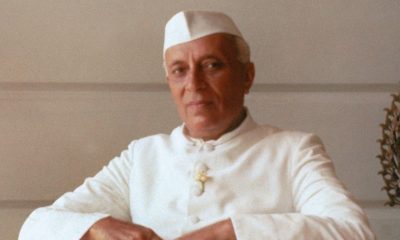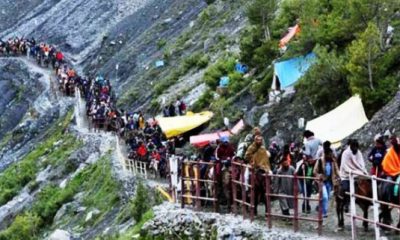World
Dalai Lama to attend Rome summit of Nobel laureates

Dharamsala: Tibetan spiritual leader the Dalai Lama will visit Italy next month to attend the 14th World Summit of Nobel Peace laureates, which was earlier scheduled in South Africa but cancelled in protest over denial of visa to him, his aide said Monday.
“His Holiness will participate in the summit of Nobel Peace laureates in Rome Dec 12-14,” Tenzin Taklha, joint secretary at the Dalai Lama’s office, told..
The summit was suspended earlier in September after the South African government failed to issue a visa for the Dalai Lama who wanted to attend the summit in Cape Town, a statement by the summit’s secretariat said.

“His Holiness the Dalai Lama with 22 other peace laureates has confirmed his attendance. Among these include Archbishop Desmond Tutu, Shirin Ebadi, Leymah Gbowee, Tawakkol Karman, Mairead Maguire, Jose Ramos-Horta, David Trimble, Lech Walesa, Betty Williams,” it said.
Rome is the city where the summit was originally conceived. The city has previously hosted the first eight world summits.
Breaking his silence last month over the South African government denying him visa under Chinese pressure, the Dalai Lama described the action like “bullying”.
“The treatment by the South African government is like bullying a humble person who has no protection,” the Nobel Peace laureate said in his address in Dharamsala Oct 2.
“They are my protection,” he said, pointing towards fellow laureates Shirin Ebadi of Iran and Jody Williams of the US, who were present at a function here to mark the silver jubilee celebrations of the Dalai Lama’s Nobel Peace Prize.
Ebadi and Williams with several laureates pulled out of the 14th World Summit of Nobel Peace laureates in protest over denial of visa to the spiritual leader. This led to cancellation of the summit.
The Dalai Lama, who lives in exile in Dharamsala, applied for a visa to South Africa Aug 27, his aides said.
This is the third time in five years that the Dalai Lama has called off his visit to South Africa, they said.
The Dalai Lama, who in 1989 was given the Nobel Peace Prize for his non-violent struggle for Tibet, now lives in exile with some 140,000 Tibetans.
World
Lockdowns in China Force Urban Communities to Defy Censorship and Vent Frustration Online

Shanghai’s rich middle class is leading a wave of online dissent over the strict and prolonged lockdowns imposed in various parts of the country. Chinese internet censorship is struggling as patience is wearing thin in many urban centers, coming up with creative forms of online protests.
Social Media Posts Revealing Lockdown Tension in Shanghai
Drawn-out lockdowns are nothing new in China as authorities insist with the nation’s zero-Covid policy since the start of the pandemic. Currently over This time around, however, metropolitan areas like Shanghai are increasingly difficult to keep quiet, given that its more than 25 million residents have seen weeks of total isolation along with food shortages and many other service interruptions.
Dozens of towns and reportedly over 300 million Chinese citizens have been affected by lockdowns of different severity. As expected, urban netizens have been most outspoken over their difficulties by finding creative ways to get around state censorship and bans placed on topics, news comments and spontaneous campaigns.
Shanghai residents have been using mobile proxies and hijacking seemingly unrelated hashtags to talk about healthcare issues, delivery failures and the overall severity of their situation. The “positive energy” that the Chinese government wants to transmit during the recent prolonged series of lockdowns does not come naturally to those counting food supplies and online censors are working hard to filter words, trending topics and undesired social media sharing.
WeChat groups and message threads are under constant monitoring. Posts questioning the zero-Covid approach have been quickly deleted, including by leading Chinese health experts like Dr. Zhong Nanshan. Video footage is soon censored and protests and investigations are quickly made to disappear.
Where this has not worked, officials have exposed banners with warnings and outright threats like “watch your own mouth or face punishment”, while drones have been patrolling the city skies. Yet, if anything, this has led to further tensions and unspoken confrontation with Shanghai’s educated and affluent middle class.
Creative Online Solutions Harnessing Civic Energy
Announcements by Chinese social media that they would be publishing the IP addresses of users who “spread rumors” have not helped either. Tech industry research has shown that much of Asia’s tech-savvy population has a habit of using mobile proxies and other privacy tools, quickly finding workarounds to browse the internet freely and talk to the world about the hottest topics.
The sheer volume of forbidden posts is already a challenge for the very censorship system, experts explain. Unable to track all trending hashtags, state workers overlook topics that speak about the US, Ukraine or other popular news. Linking human rights elsewhere to their situation, Chinese online dissidents establish their informal channels and “hijack” the conversation to share personal or publicly relevant information about the Covid suppression in their town.
Sarcastic and satirical posts still dominate. Others hope to evade the censors by replacing words from famous poems or the national anthem. One thing is certain – social media, when harnessed with the right creativity, has proven its ability to mount pressure on the government in even some of the most strictly controlled tech environments like China.

















